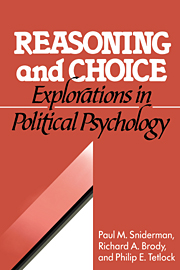Book contents
- Frontmatter
- Contents
- List of tables and figures
- Preface
- 1 Introduction: major themes
- 2 The role of heuristics in political reasoning: a theory sketch
- 3 Values under pressure: AIDS and civil liberties
- 4 The principle–policy puzzle: the paradox of American racial attitudes
- 5 Reasoning chains
- 6 The likability heuristic
- 7 Democratic values and mass publics
- 8 Ideological reasoning
- 9 Information and electoral choice
- 10 Stability and change in party identification: presidential to off-years
- 11 The American dilemma: the role of law as a persuasive symbol
- 12 Ideology and issue persuasibility: dynamics of racial policy attitudes
- 13 The new racism and the American ethos
- 14 Retrospect and prospect
- Notes
- Bibliography
- Subject index
- Author index
10 - Stability and change in party identification: presidential to off-years
Published online by Cambridge University Press: 05 May 2010
- Frontmatter
- Contents
- List of tables and figures
- Preface
- 1 Introduction: major themes
- 2 The role of heuristics in political reasoning: a theory sketch
- 3 Values under pressure: AIDS and civil liberties
- 4 The principle–policy puzzle: the paradox of American racial attitudes
- 5 Reasoning chains
- 6 The likability heuristic
- 7 Democratic values and mass publics
- 8 Ideological reasoning
- 9 Information and electoral choice
- 10 Stability and change in party identification: presidential to off-years
- 11 The American dilemma: the role of law as a persuasive symbol
- 12 Ideology and issue persuasibility: dynamics of racial policy attitudes
- 13 The new racism and the American ethos
- 14 Retrospect and prospect
- Notes
- Bibliography
- Subject index
- Author index
Summary
How does the minimalist argument and our revision of it apply to so basic a political orientation as one's sense of partisanship? Those who first argued the minimalist position treat partisan identification as exceptional, indeed unique, among political attitudes: It is hypothesized to be learned early and well; to resist erosion even in the wake of vote defection; and to strengthen over the citizen's political life cycle. It is the principal long-term force that, in the electoral setting, affects the way we think about issues, candidates, and campaigns and, in nonelectoral settings, affects our responses to the performance of officials and political institutions. In sum, partisanship is considered the one real and reliable guide to the American voter confronting the buzzing confusion of American politics.
This view of partisanship has been revised by recent scholarship: The meaning of “independence” has undergone sustained scrutiny. The consensus emerging from these investigations holds that “independence” is a mixed category; the independent-partisans (so-called leaners) are very different from independents who feel close to neither major party (so-called pure independents). The consensus breaks down when confronting the question of whether to treat leaners as “hidden partisans” or as independents who, with their statement of partisanship, announce their intended vote. The following chapter enters this dispute by examining the interelection stability of leaners' partisanship. […]
- Type
- Chapter
- Information
- Reasoning and ChoiceExplorations in Political Psychology, pp. 179 - 205Publisher: Cambridge University PressPrint publication year: 1991
- 1
- Cited by



